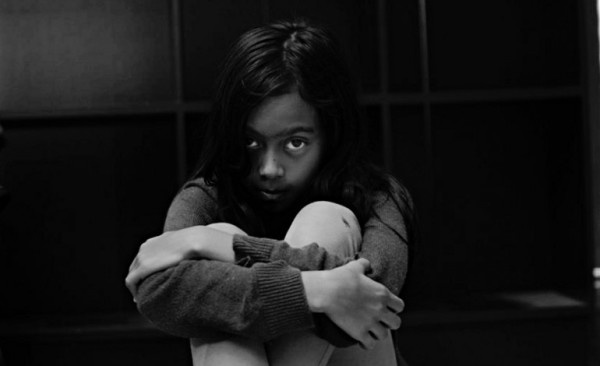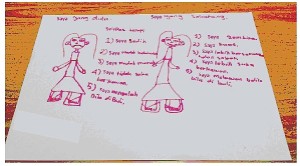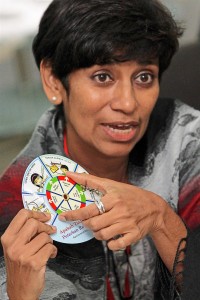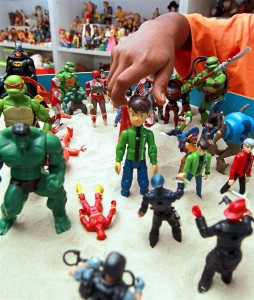Betrayal: A story of child sexual abuse
June 5, 2015 · By S. INDRAMALAR for www.star2.com

It is very rare for a child to speak directly about the abuse, thus it’s the adults responsibility to be alert to red flags in their conversations and actions. (Posed picture for Youth 2).
Every time she heard the sound of a motorcycle whizzing by her house, nine-year-old Latifah would hide inside a cupboard in her room, shaking with fear.
She was terrified that the sound meant that the man she feared the most, a well-respected religious leader in her village, was approaching and that she would be assaulted yet again.
Since she was seven, Latifah had been routinely molested by the elder.
The abuse went on for two years before she found the courage to tell her family about what he was doing to her.
At first, Latifah was given oral psychiatric medication to help with her depression and mood swings. Her family didn’t think therapy was necessary.
However, Latifah couldn’t cope with the trauma of the abuse. She began to hurt herself, refused to go to school and had sudden angry outbursts.
Latifah’s mother realised that she could not cope and sought the help of the Women’s Centre for Change and threapeutic play specialist Christine Teoh in Penang.

Latifah drew herself as sad before therapy (left) and happy, after therapy. — WCC
Latifah was experiencing post traumatic stress disorder or PTSD which manifested, among other things, in nightmares, says Teoh.
“In my dreams, I was constantly being smothered by someone over and over again,” Latifah shared.
The young child felt betrayed not only by her abuser but by her family too.
“I blamed my family. Why didn’t they protect me from him? Why was he not punished?” she would ask her therapist.
Latifah also found it hard to function during the day. She became depressed and anxious and disassociated herself from the people around her.
That was her way of coping with the trauma. She began regressing. She started wetting her bed and sucking her thumb, as a young child would.
“Each time there was a trigger, such as the sound of a motorcycle, Latifah would relive the experience of being molested. To make matters worse, she still lived in the same village as her perpetrator and so the trauma was still very real.
“She began to lose interest in the activities and hobbies she used to enjoy and became withdrawn. It was too much for her psyche to deal with,” says Teoh.

Women’s Centre for Change programme consultant Prema Devaraj showing an educational tool that is a part of WCC’s ‘Be Smart, Be Safe’ or ‘Bijak Itu Selamat’ child sex abuse prevention programme kit. — Filepic
It wasn’t easy for her family either as they came under attack from others in the village who believed they were sullying the name of one of their leaders and also the village.
They stuck to the treatment and reported the abuse, nonetheless.
It’s been a year since Latifah began therapy and she is slowly picking up the pieces of her shattered childhood, says Teoh.
“She has started going back to school regularly again and is more confident of herself. She is also learning to trust again. Through play therapy, she has learnt healthy coping mechanisms to help soothe her emotions. Therapy is no longer a crutch.
Therapy, says Teoh, aims to provide corrective experiences for the child that can enable them to regain trust, safety and wellbeing in their lives. Play and creative therapy, which are what she applies, are based on an understanding that play is a child’s natural medium of self expression.
“Toys are children’s words and play is their language. Through play, they can ‘play out’ their feelings and problems,” explains Teoh.
Latifah is fortunate to have the support of her family. Family support is crucial for a child who has been through such a betrayal of trust.

Play and creative therapy helps children express their feelings. — Filepic
“Child abuse violates a child’s trust at the very core. When the offender is a family member, a carer or primary caregiver, the emotional impact hits harder.
“A child’s world revolves around his or her parents or primary caregivers, who are supposed to be their source of love, safety, security, nurturing and support.”When the primary relationship is one of betrayal, a negative set of beliefs start to develop instead.
“If not addressed and treated, this betrayal of trust early on in life can affect the child’s ability to form and sustain relationships all through their lives,” says Teoh.
There is no one way to react when you find out your loved one or child has survived sexual abuse, she says. However, Teoh says the parents or caregivers must learn to manage the situation in order to support the survivor.
“Children take cues from adults they love in determining how to react once the abuse is uncovered. It is important for parents or carers to be nonjudgmental and supportive listeners. Seek help as it isn’t possible to cope with all the emotions on your own,” advises Teoh.
The effects of child sexual violence are both short term and long term and these differ from case to case.
Among the common short-term effects are pain, fatigue, tension, fear and anxiety, a sense of powerlessness and helplessness, isolation, guilt, shame and self-blame, anger, sadness, a loss of identity and flashbacks which cause sleep disorders.
Long-term effects include physical symptoms such as sexually transmitted diseases and unwanted pregnancies, as well as behavioural problems include eating disorders, excessive clinginess, aggression, phobias, problems at school or refusal to go to school and outbursts of rage.
“One of the most common experiences of survivors are relationships that are full of conflict as well as chaotic lives. In adulthood, they face difficulties in forming intimate attachments and display behaviours that threaten and disrupt close relationships.”
The Women’s Centre for Change, Penang (WCC) has a educational package called Be Smart, Be Safe (Bijak Itu Selamat) to teach children personal safety in schools. The package contains educational tools and includes a 30-minute video – a brand new one has been included – with reneactments of real-life stories to teach children lessons on how to stay safe.
The video also has a commentary, cartoons and songs to help teach children about their bodies as well as the difference between “good touch” and “bad touch”, the package is available for RM30 and contains other interactive teaching materials and a manual for teachers and parents to identify and deal with child sex abuse cases.






